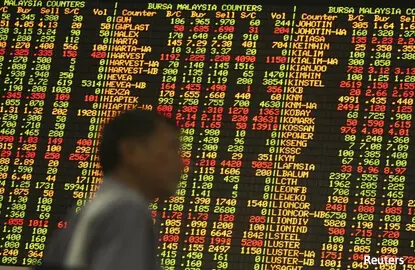Asian shares tracked Wall Street higher on Wednesday as U.S. rate cut fever lingered near the year’s end, while oil held onto gains from the past two days after attacks by Houthi militants on ships in the Red Sea disrupted maritime trade.
Meanwhile, the yen nursed losses at a one-week trough and Japanese yields extended declines after the Bank of Japan held its policy steady and gave no sign on when it may end negative interest rates, further aiding risk appetite.
MSCI’s broadest index of Asia-Pacific shares outside Japan rose 0.6 per cent, aided by a 1.2 per cent jump in Hong Kong stocks, a 0.5 per cent rise in Australia’s resources-heavy shares and a 1 per cent jump in South Korea.
Japan’s Nikkei surged 1.6 per cent to the highest in about one month, building on gains from Tuesday. The yen was fetching 143.82 per dollar after an overnight drop of 0.8 per cent and benchmark ten year yields fell by another 6 basis points to 0.570 per cent, the lowest since early August.
China’s central bank left its benchmark lending rates unchanged on Wednesday, as widely expected.
Overnight on Wall Street, the Dow Jones rose 0.7 per cent, nabbing another all-time closing high, and the Nasdaq Composite also added 0.7 per cent to the highest level since January. The S&P 500 gained 0.6 per cent.
The rally was fuelled by an unexpectedly dovish tone from U.S. Federal Reserve Chair Jerome Powell last Wednesday on rate cut prospects next year, with the stock market having paid little attention to the pushback since from other Fed officials.
Richmond Fed President Thomas Barkin on Tuesday welcomed the retreat in inflation but refrained from saying how that affects his outlook for policy next year. Atlanta Federal Reserve President Raphael Bostic said there was no urgency to cut rates.
Analysts at JPMorgan expect a more challenging macro backdrop for share markets next year as the recent disinflationary trend should become a major headwind for corporate margins, adding that they favour cash and bonds.
“It has become consensus that a recession will be avoided, while equity multiples appear rich, credit spreads are tight, and volatility is unusually low. Thus, even in an optimistic scenario, we believe upside is limited for risky assets,” they said in a note to clients.
A BofA fund manager survey showed on Tuesday that investors turned more bullish in December, buying stocks and reducing cash holdings. They had the biggest overweight position in bonds since 2009.
Falling yields also propped up equity valuations. Benchmark 10-year yields slipped 1 basis points to 3.9163 per cent, just above their five-month low of 3.8850 per cent, while two-year yields were little changed at 4.4373 per cent, nearing a seven-month trough of $4.2820.
Elsewhere, oil prices were gripped by worries about the maritime disruptions in the Red Sea after Yemen’s Iran-aligned Houthi militants stepped up attacks on commercial ships in recent weeks. The U.S. announced the creation of a task force to safeguard commerce in that area.
U.S. crude futures gained for the third straight day, up 0.2 per cent to $74.09 per barrel, after surging more than 1 per cent on Tuesday, while Brent was steady at $79.21 per barrel.
Norway’s Krone gained 1.2 per cent overnight to 10.272 per dollar, the highest since mid August. Commodity currencies such as the Australian dollar outperformed, with the Aussie advancing 0.8 per cent overnight to a fresh-five month high of $0.6774.
S&P Global Market Intelligence expects that it is likely all three major shipping alliances will halt services, covering up to 85 per cent of all container fleet crossings of the Suez Canal.
“A reduction in commodity product crossings of Suez may drive a bifurcation in oil, refined oil and other commodities between Asian and Atlantic basin markets, and potentially more volatility in prices,” said Chris Rogers, head of supply chain research at S&P.
Spot gold was flat at $2,039.59 an ounce. – Reuters









